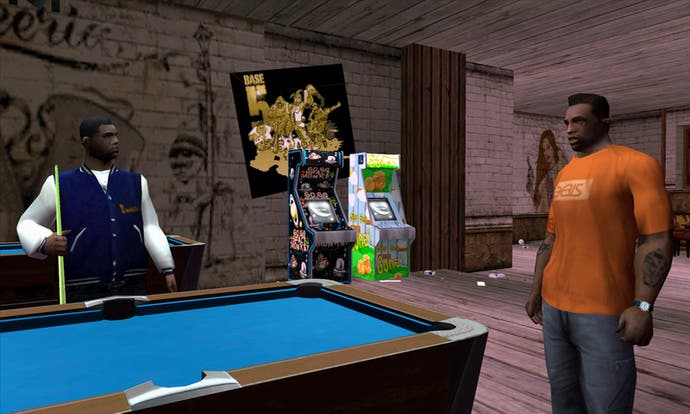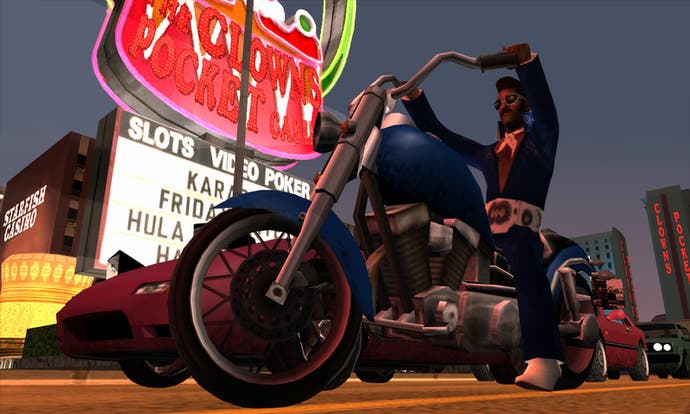Hot Coffee could burn mod makers
A worrying possibility.
We were in a hotel room with Rockstar yesterday. "Hot Coffee" was neither served nor offered.
Rubbish intro out of the way - we were sitting here earlier thinking about all this excitement surrounding unlockable sex mini-games in GTA: San Andreas, which have been dubbed Hot Coffee for reasons we can't be bothered to look up, and something crossed our minds. A bad thing. A thing that, were it to play out, would be bad news for gamers, mod makers, developers and publishers, who are probably already exchanging nervous glances over the ubiquitous water cooler regardless. And yet, at the same time, a thing that's not completely unimaginable.
While we'd imagine that vocal proponents of modding, like Half-Life developer Valve and the Doom scribes at id Software, are unlikely to change any of their plans in light of this latest storm-in-a-coffee-mug media explosion, the screaming politicians might make an impression on smaller publishers and developers. Because right now there's little distinction between whether Hot Coffee was in the game already, or created by someone else.
And those publishing folks could be troubled by the idea of being lambasted by the international press, or denied certification by ratings boards that parents are increasingly being instructed to consider when buying games for those under the age of 18, or perhaps even worse.
Politicians - particularly American ones, oddly enough - regularly use videogames as a tool to find some moral high ground and win some votes. Rockstar has made these sorts of headlines before with Vice City's notorious "Kill all the Haitians" line and Manhunt's moral-compass-on-spin-cycle antics. Most recently Eidos was in the news after a US senator hurled mud at its forthcoming cops-and-robbers title 25 to Life for its cop-killing aspects. Never mind the fact the game wasn't finished.

In the most extreme cases these campaigns have led to games being withdrawn and remastered with offending material cut, or denied certification, and this can be an expensive business for those involved. Litigation is rare, but as the Manhunt case arguably proved, a lot of the concepts involved baffle and divide in equal measure, and the potential for conflict - whether legal or in public relations terms - is often there even if most gamers could highlight the gaps in logic within seconds. Politicians are good at making the average Joe see this stuff in the worst possible light, and a lot of the mainstream media will race to sensationalise it too.
There's obviously a temptation to dismiss the Hot Coffee hullabaloo because the content was likely already hidden on the disc (Rockstar currently disputes this), reasoning that that's a situation we're unlikely to see too often. But the thing that strikes this writer is that nobody on the shouty side of the debate is all that interested in whether it was there to begin with or not. Even assuming Rockstar's completely blameless on this front, our worry is that the media and mud-slinging politicians who are seizing upon this won't accept that as a defence, and will start to hold publishers responsible for what people do with their games whether they add components themselves or not.
How long before mods in general bear the brunt of this?
People can do a lot with games these days. We've been playing with Garry's Mod for Half-Life 2 a lot lately. It lets you deposit virtually any object from the game in an enclosed play area and then manipulate it using things like balloons, nail guns and the game's weapons. Virtually anything is possible - you could theoretically build a cross, drop Half-Life 2's female lead Al into the play area, and then nail her to it and do goodness only knows what else. The wrong people will spot this sooner or later, particularly if this lack of distinction between user-made content and hidden developer-made content continues.

This could be a massive problem for mod makers. If people outside the games industry start holding publishers accountable for the things people can do with their software, they may want to avoid that problem entirely by restricting access to their source code. Rockstar's already planning to do that, it said this week. Given the way the above example would sit with the majority of Christians, you'd be able to appreciate their concern.
One solution you might consider is obviously moderation. Microsoft is bound to be thinking about that this week, as one of the key components of its Xbox 360 online offering is a "mod market" affair that lets players resell their own user-made content to one another, and that could become a focus for excitable media outlets in the coming days. The assumption must be that there's a degree of moderation involved in Microsoft's offering anyway, but how many other companies can afford to do that? And what if the American ERSB sets a precedent with San Andreas of re-rating the game because of mod content? There'd be problems left, right and centre. With PC games, which traditionally sell poorly compared to their console cousins, the returns probably wouldn't justify the costs in most cases.
And if you think this all sounds quite far-fetched, consider one worrying parallel - between Rockstar's current position and that of Grokster, the company the Recording Industry Association of America recently finished dragging through the courts because its peer-to-peer software can be used to distribute things illegally without any restriction. Videogames can be used to do horrendous, even illegal things without any restriction, even if the majority of mods aspire to do nothing more than provide harmless entertainment to people who've exhausted the stuff that came out of the box. Okay, that was a different situation involving copyright and the infamous DMCA, but it does show that American courts are willing to listen to these kinds of arguments.
With any luck, our silly little fears will never amount to anything. We hope, for the sake of the thousands of amateur game designers whose creative outlet could come under the spotlight through all of this, that someone cries pot, kettle, black on those sensationalising Hot Coffee. Because if mods were to be wiped away or severely restricted, the ramifications for game development in general would be extreme.

